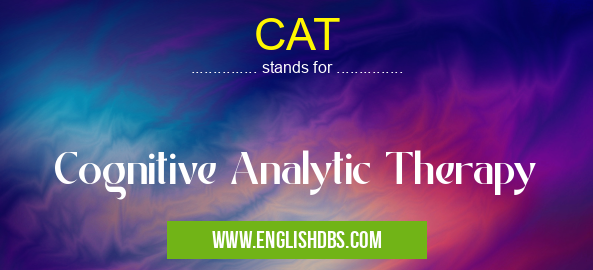What does CAT mean in THERAPY
Cognitive Analytic Therapy (CAT) is a form of psychotherapy that combines cognitive therapy principles with a systemic and analytic approach. CAT focuses on how thoughts, feelings and behaviours are connected to each other and how these connections can be better understood in order to make positive changes in one's life. It looks at the areas where negative patterns of thinking may have developed over time, along with identifying key areas of distress in order to overcome any issues related to our psychological well-being. CAT also considers the impact of attachment and relationships on our current patterns of behaviour and thinking.

CAT meaning in Therapy in Medical
CAT mostly used in an acronym Therapy in Category Medical that means Cognitive Analytic Therapy
Shorthand: CAT,
Full Form: Cognitive Analytic Therapy
For more information of "Cognitive Analytic Therapy", see the section below.
Main Body
The goal of Cognitive Analytic Therapy is to help individuals become aware of their unhelpful behaviour patterns which they may have developed as a result of past experiences. These destructive patterns can be very difficult to change without understanding them and then recognizing the underlying causes that initiated them. By exploring these connections, it becomes possible for us to think about new ways of understanding ourselves, others and our own behavior, enabling us to make more conscious decisions about how we act in certain situations or how we respond emotionally to certain people or events. CAT encourages clients to examine their personal stories as well as the relationship dynamics between themselves and others which may have shaped their emotional responses in certain situations or contexts. This type of exploration helps therapists gain insight into the emotional dynamics at work within an individual's life, allowing for improved understanding about why some emotions or behaviors might arise when dealing with particular aspects of one's environment or interpersonal relationships. The therapeutic process also involves client-therapist dialogue aimed at creating an action plan for overcoming any identified difficulties or conflicts within a person's life. Through this process, individuals can learn relevant self-management skills as well as explore more helpful responses towards various scenarios they might encounter throughout their lives moving forward.
Essential Questions and Answers on Cognitive Analytic Therapy in "MEDICAL»THERAPY"
What is Cognitive Analytic Therapy (CAT)?
Cognitive Analytic Therapy (CAT) is a type of psychotherapy which integrates cognitive, behavioural and analytical approaches with systemic thinking. It aims to help people think about and understand patterns of behaviour in their life which might be causing them distress. It helps people understand how their past and present experiences are influencing their current thoughts, feelings and behaviours.
Who can benefit from Cognitive Analytic Therapy?
Cognitive Analytic Therapy can be helpful for individuals experiencing a range of difficulties, including depression, anxiety, relationship problems, self-esteem issues, and personality disorders. CAT is also used increasingly in the treatment of long-term physical health issues where emotional or psychological factors are involved.
What happens during Cognitive Analytic Therapy?
During Cognitive Analytic Therapy sessions you will have space to talk about your feelings and thoughts in order to gain clarity around how your past experiences could be affecting present day patterns of behaviour or thought processes. With the help of your therapist you will build an understanding of how these patterns developed over time so that you can begin to identify new ways of responding that bring greater wellbeing.
How long does a Cognitive Analytic Therapy session last?
A standard therapy session usually lasts between 50 minutes - 1 hour which allows you enough time to explore any relevant topics or themes without being rushed. It's important that you feel comfortable throughout the process so if anything needs more attention or requires more focus then there would be time allocated within the session for this.
Do I need to do any work outside the session?
At times it may be useful for you to complete some activities outside of your sessions as part of your therapeutic process such as journaling or setting goals. This will be agreed with you by your therapist prior to completing any additional tasks.
Final Words:
In addition to providing insight into past experiences that may have shaped one's current way of behaving and responding emotionally, Cognitive Analytic Therapy aims to equip clients with skills that will allow them to effectively manage any existing difficulties as well as face future problems with greater confidence. It is ultimately an empowering therapeutic tool available for those seeking out assistance in gaining control over their negative thought patterns and behaviors.
CAT also stands for: |
|
| All stands for CAT |
